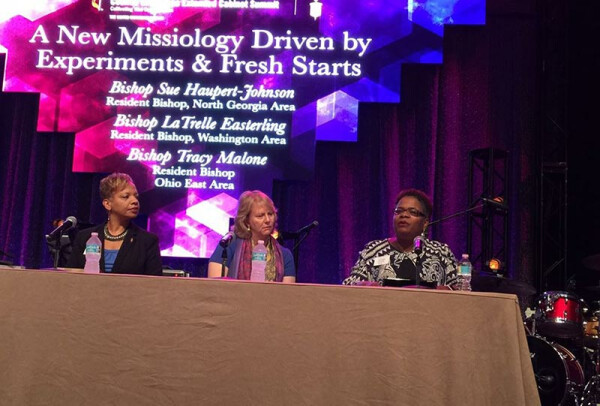BWC leaders explore courageous leadership
By Melissa Lauber
UMConnection Staff

“The entire United Methodist Church is holding its breath,” said Bishop Bruce Ough, president of the Council of Bishops, as he addressed more than 800 annual conference leaders gathered in Jacksonville, Fla., Nov. 2-4. “Will the Holy Spirit break through and fill our church with new breath or will we expire breathless?”
Ough challenged those at the quadrennial Council of Bishops Extended Cabinet Summit to redirect and renew their focus, energy and resources to cultivate vital congregations to make disciples for the transformation of the world.
Bishop LaTrelle Easterling and the 15 members of the Baltimore-Washington Conference Extended Cabinet accepted this challenge.
Throughout the Summit, church leaders heard how the institutional church is in a deep and dramatic decline and how its relevance to American culture is diminishing.
“We are being called from a posture of malaise to a posture of prayer and missional clarity,” said Ough, episcopal leader of the Dakotas-Minnesota Area, who told the group that they know the “what” of being church; now they need to recapture the “why.”
To illustrate this point, he showed a video clip of the comedian Michael Jr., who on his webcast BreakTime asked a school music teacher, at random, to sing a few bars of “Amazing Grace.”
The teacher did, and sang well. “Now,” Michael Jr. said, “I want you to give me this version – your uncle just got out jail, you got shot in the back as a kid … Let me see what you got.”
The man launched into a passion-filled, soul-stirring rendition of the same song.
The “why” brought a whole new set of options to the “what,” Michael Jr. observed.
“The first time I asked him to sing, he knows ‘what’ he was singing. The second time, he knew ‘why,’” Michael Jr. said. “When you know your ‘why,’ your ‘what’ has more impact because you’re walking in or toward your purpose.”
“Are you ready to help the church embrace its ‘why,’” asked Ough. “Let’s go do the ‘why.’”
But to help church live out the ‘why’ of their work, courageous leadership is needed, said Bishop Grant Hagiya of the California Pacific Area.
Being of “good courage,” as described in Deuteronomy 3:16 and 2 Corinthians 5:6-10, means quietly taking on the strength of character and integrity of Christ and doing what is right as one works to make disciples and transform the world.
One of the greatest enemies of courage is popularity, Hagiya said. Church leaders must “really struggle against wanting to be liked, wanting to be loved, wanting to belong. We need courage, not popularity,” he said. “To be popular will not change our church, it will cement the status quo and we won’t have a future.
“We also need to have the courage to fail” – not being afraid to “fail early and fail often. As long as we learn from our mistakes, failure could be one of our greatest resources,” Hagiya said.
Courageous leaders are also not afraid of conflict and loss, and can use both creatively to bring about positive change, said Hagiya. He encouraged everyone there to consider that small changes can make significant differences.
Consider, he said, that there is only a four-percent difference in the DNA between a human and a chimpanzee. That small difference has an enormous impact. He encouraged every leader to consider what do they want to keep and what do they want to give up, urging them to keep the Wesleyan DNA, the uniquely Methodist history, doctrine and theology that makes the church and its members faithful and strong.
While taking time for discernment and reflection is important, intention cannot replace action, said Bishop Jonathan Holston of the Columbia Area in South Carolina. “Get in the game and implement,” he said. “If it’s important to you, you’ll make it happen. If it’s not important to you, you’ll make an excuse.”
Throughout the summit, church leaders heard 10 presentations about the missiology and practice of vital congregations, how the denomination’s four foci can create a culture of vitality, and how they can more effectively hold the spirt of their church in their hands. They also participated in five worship experiences and met in dialogue with leaders from annual conferences similar to theirs.
In the closing sermon of the summit, Bishop Cynthia Harvey of the Louisiana Area shared the metaphor of how the roots of the ancient giant redwood trees are shallow and intertwined. One would expect these soaring trees to have deep roots. Instead, she said, they grow close and their roots become entangled, allowing them to stand tall together.
The roots are gnarled, but “it’s not nice and neat that makes us strong,” Harvey said. “As a church, we, too, must rely on one another to hold one another up. We must become entangled.”

